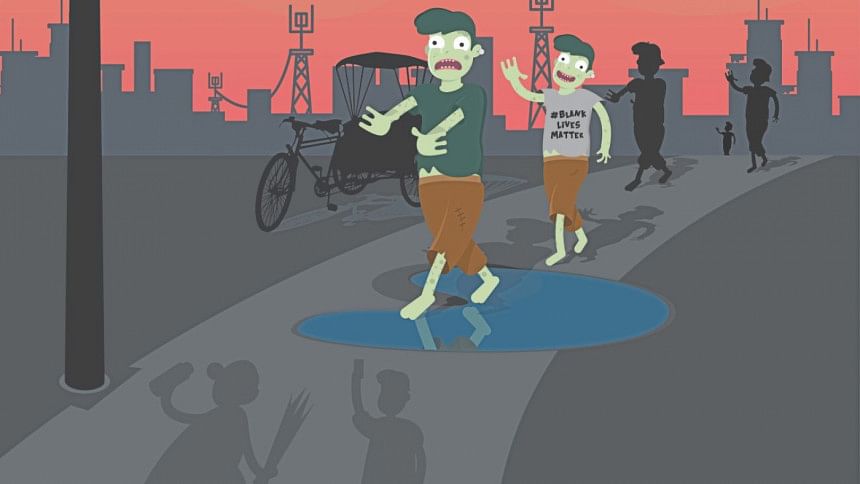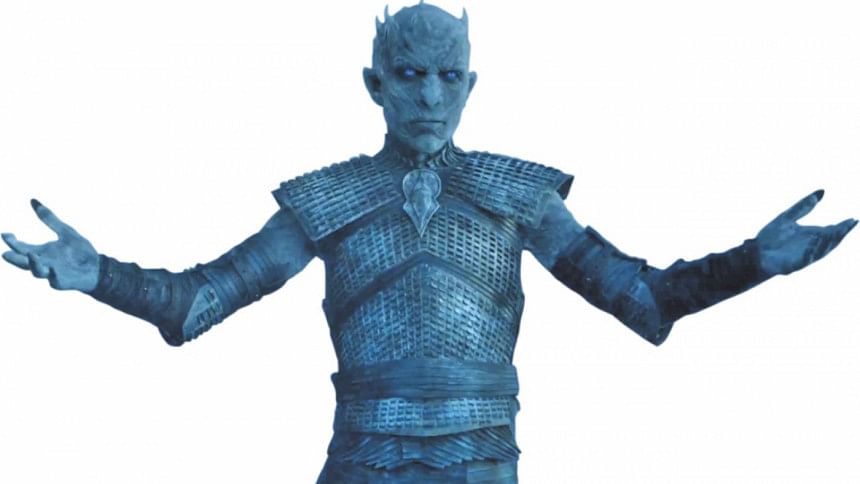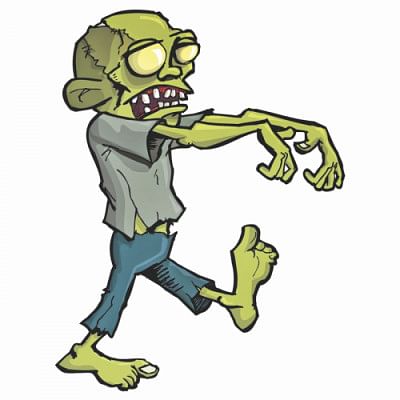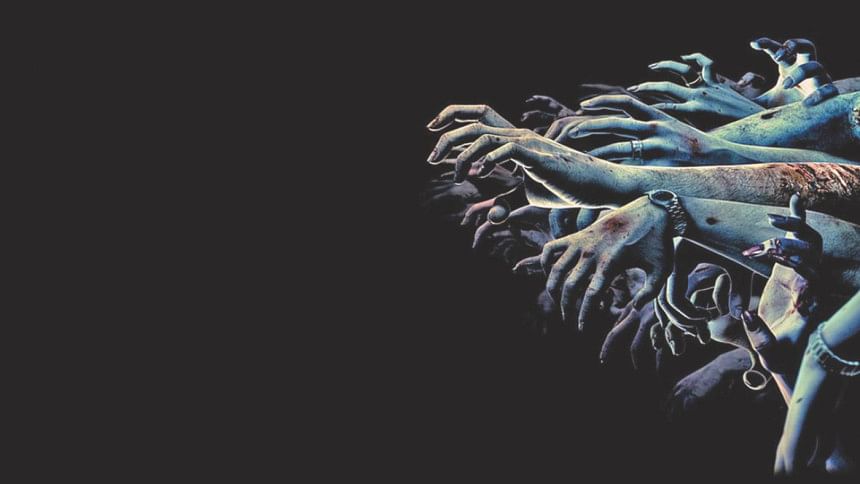Surviving Zombie Apocalypse in Dhaka

Anaf's mother had just finished typing "mamdo bhoot" after an hour's struggle with Bangla font in the Google search bar when a man outside her window shouted something in a dialect. According to the news, the newly arrived ghosts from the western world hadn't reached their neighbourhood yet. Living in Uttara had its perks – nothing reached there on time. But Anaf's mother knew well enough to not always trust the media. Freaking out, she ran to Anaf, who had been taking lessons at the local club to fight the man-eaters.
Anaf woke up at once and ran to the window with Jomila Bua's jharu – the magical weapon that can kill spiders, ants and now, zombies. To his utter disappointment, it wasn't a zombie but a man selling fish.
"It's just the local hawker, ammu. And how many times do I have to tell you that the attackers are zombies, not mamdo bhoot?" Anaf yelled.
Anaf didn't know what was more difficult: to make his mother understand that a mamdo bhoot is not the same as a zombie, or to actually survive the zombie apocalypse. He had been watching zombie films on Deadflix with his family ever since the apocalypse alert came up. At first, Anaf's parents had difficulties understanding what zombies were and why they did what they did. So, Anaf showed them clips from Thakurmar Jhuli so they'd get the references. Clearly, that was a mistake.

Anaf's father firmly believed the zombies were a part of the western propaganda; a conspiracy against the people of his kind. He also believed that there was nothing his wife's firni could not solve. Even if there were man-eating zombies for real, they would forget about all about it once they tasted Anaf's mother's firni.
By the time the apocalypse reached Uttara, most areas of the city were swarming with zombies. Selfies with zombies had become a thing on the internet already. People were divided in their opinions as well. Some said the zombies were like their brothers and empathised about their bad luck with the virus. The others were ready to chop off the zombies' heads. Memes were being made and shared by the meme kings and queens. A few zombies had firm belief in the human-zombie romantic affair (as told in the book Warm Bodies) and they had given up on fighting the humans. Some of them had even opened Facebook accounts to send marriage proposals to the humans of their choices.

Anaf had been brushing up his fighting skills and waiting eagerly to put them to use. He, along with the whole neighbourhood, was ready to attack the ugly zombies with their hockey sticks, jharu and aerosol. Uttara had to be saved, and then the whole city.
Anaf and his family got dressed in formal clothes the day those zombies arrived in a very peculiar cinematic motion. Anaf posted pictures of himself on social platforms describing how excited it felt to be facing the monsters of 21st century. It was different from what they saw in movies. The zombies did not bend their shoulders so much as the movies; neither did they wear ragged clothes. They looked like average human beings with limps. As they shambled closer to the entrance of the area, everyone held on to their jharu and bamboo sticks – ready to put up a fair fight and hopefully, slay the crooked monsters. Even Jomila Bua was there, with an aerosol in one hand and a jharu in the other.
Anaf's father threw the zombies some coins hoping they would run away, being pleased with the money. He felt proud about his throwing skills when the coins landed right in front of the approaching creatures. To his utter disappointment, not one of the zombies showed any interest in the money. He could not understand how these poor little creatures, who couldn't even walk properly, would not accept something as precious as money. He made a mental note about how he would always keep his morals up by looking out for money if he ever got the virus and then silently blamed socialism for the tragedy that had just occurred.
After a few hours, when the humans were finally face to face with the zombies, the long awaited fight started. Jomila Bua was the first to take down a young zombie with Anaf right behind her. The two made a brilliant team and killed more than anyone in the battalion. Anaf's mother had secretly brought some firni to lure a group of "mamdo bhoot", and to her surprise, it worked. She cornered a few of them who dived into the firni without hesitation. Sadly, as soon as she ran out of the divine rice pudding, she had to run to her husband before the zombies joined the battle again.

With a lot of their fellow brothers and sisters lying on the floor, the brave residents of Uttara realised they could not win against these apparitions. They had run out of aerosol and their jharu were no less than stick figures now. The zombies were too many in number and even strong warriors like Jomila Bua and Anaf were injured. That's when they realised, they had to run.
Running wasn't easy. Anaf's father had porota that morning and his suit was made of a heavy fabric worth thousands, making it even more difficult for him to run with his handsome bhuri. First, it was a marathon and the gang of Uttara had made quite an impressive effort. Shortly, as the sun started going down, the zombies shambled faster and what was once a marathon soon turned into a sprint, with Jomila Bua leading the humans.
The humans got on several bridges in the next few hours, with the zombies left behind by a mile or two. The well-built bridges and flyovers of Dhaka slowed the monsters down. At one point, Anaf thought the whole thing seemed like a scene from the game Temple Run; but unlike the game, the humans were actually able to leave the zombies far behind.
Soon, they were out of Uttara and into Banani, the kingdom of food, friends and young blood. As they searched for a place where they could rest and eat, they realised the whole area had been taken over by zombies. Anaf's favourite was a joint where they sold six layered burgers for a fortune. He could not hold his tears back as he saw a 12 year old zombie devouring his favourite burger through a blurry window of the café. Anaf's mother could not believe all the supermarkets and food joints were now occupied by the mamdo bhoot she once feared as a kid.
"Is this the end of the world?" she asked.
"Haw beta," Jomila Bua replied in a defeated voice.

Anaf and his neighbours did not always agree with each other back in Uttara. But all of them agreed to start running again when Jomila Bua suggested finding a new place for survival. As they reached the flyover this time, they were overwhelmed to see lots of human beings stuck in line, trying to flee from the zombies who had by then taken over the whole city. They had mixed feelings experiencing the human traffic they once faced in Dhaka. They were all headed to the one place where they could start anew, one place without the monsters around them.
After one whole day of being stuck in line, the humans finally reached the precious area located at the heart of Dhaka. The giant gates of this far-away place welcomed them to the only part of the city exempt from zombies. Jomila Bua could not believe she would be calling this place home in a few days. The people of Uttara had finally found their second home.
As they entered the gate, Anaf looked at his parents with teary eyes and said, "Cholona Bashundhara-e jai".
Mashiat Lamisa is often seen frowning at the sight of people who dislike poetry and tomatoes. She can be reached at [email protected]

 For all latest news, follow The Daily Star's Google News channel.
For all latest news, follow The Daily Star's Google News channel. 



Comments